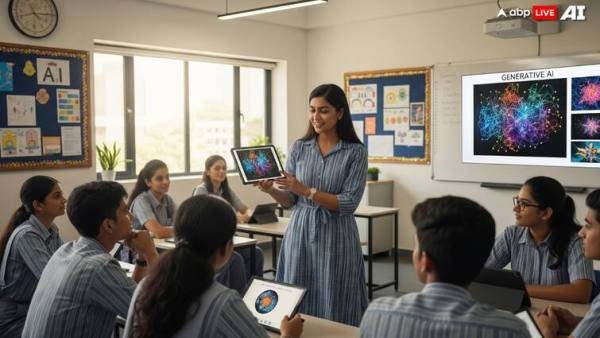
— By Harish Kumar and Swarn Zargar
Generative Artificial Intelligence (GenAI), including tools like ChatGPT and CoPilot, is rapidly reshaping education. From assisting with writing tasks to solving complex problems, GenAI offers immense potential to enhance learning. But as these technologies proliferate, a critical question emerges: Does GenAI enhance students' skills, particularly critical thinking, problem-solving, and creativity, or does it undermine them by offering shortcuts that bypass deep cognitive engagement?
Understanding GenAI And Student Skills
Generative AI refers to algorithms that autonomously create content such as text, images, and solutions based on learned patterns from large datasets. These tools mimic human thought processes, enabling them to generate ideas, solve problems, and produce creative work efficiently.
For students, foundational skills like critical thinking, creativity, and problem-solving are crucial for academic success. While GenAI can support these skills, there is growing concern that over-reliance on AI could erode students' ability to engage deeply with the material.
How GenAI is Shaping Student Learning
GenAI offers clear benefits in personalised learning. AI-powered tools can adjust to students' individual needs, offering real-time feedback and tailored solutions. These tools are especially valuable in areas with limited access to educational resources, enabling students to learn more effectively.
For instance, AI-driven platforms like writing assistants and math solvers help students improve their skills by suggesting better phrasing, correcting grammar, and providing step-by-step solutions to complex problems. A 2020 study by the National Bureau of Economic Research found that AI-powered learning tools increased student engagement by up to 25%, with notable improvements in subjects like math and reading.
However, while GenAI improves efficiency, does this help develop critical skills, or does it simply reduce the time spent on deep learning?
Will GenAI Increase Or Decrease Critical Thinking?
For students, GenAI presents both opportunities and challenges. On the one hand, AI tools can enhance learning by automating routine tasks like grammar checking or problem-solving, enabling students to focus on higher-order thinking.
However, research from the University of Michigan (2021) shows that students who frequently use AI for assignments display a 30% reduction in cognitive engagement. While these tools provide immediate answers, students may miss out on the cognitive benefits of analysing and struggling with material independently.
The Journal of Educational Psychology found that students who used AI for assignments performed well initially but showed weaker long-term retention and problem-solving skills compared to those who engaged deeply with the material.
GenAI and Children: Unlocking Potential Or Raising Concerns?
For children, the implications of GenAI are particularly significant. AI tools can foster curiosity and creativity, offering personalised learning experiences that traditional methods may lack. AI-powered games and educational tools adapt to children's learning pace, making subjects like math, science, and languages more engaging.
However, research raises concerns about the effects of excessive screen time and overuse of AI. The American Academy of Paediatrics warns that prolonged exposure to digital tools could impair cognitive and social development in children. A 2020 study by the OECD found that children who spent excessive time using digital tools, including AI, showed slower cognitive development, particularly in attention span and independent thinking.
Experts recommend that children use AI tools under parental or educational supervision to ensure these technologies support learning without compromising critical thinking and problem-solving skills.
Risks To Foundational Skills from Over-Reliance on GenAI
The primary concern with GenAI is its potential to erode foundational skills. While AI tools offer instant solutions, the process of struggling with and solving problems independently is essential for developing critical thinking and problem-solving abilities. Studies, including one by the OECD, show that over-reliance on digital tools can lead to reduced retention and weaker cognitive engagement. Students who use AI to bypass challenging tasks may develop a superficial understanding of the material, impairing their ability to apply knowledge across different contexts.
Moreover, AI-generated content can sometimes be inaccurate or biased. If students accept AI-generated answers without questioning them, they risk internalising incorrect information, undermining their ability to critically assess content.
Building Trust In AI And Human-AI Collaboration
For GenAI to be effective, trust is essential. Transparency in how AI systems work and their limitations helps users critically evaluate AI-generated content. Educators must foster an environment where students use AI responsibly, ensuring it enhances, rather than replaces, cognitive development.
Striking a Balance: Enhancing Skills Through Smart AI Use
The key to benefiting from GenAI lies in balancing its use. By using AI tools as aids rather than crutches, students can enhance their skills without compromising cognitive development. Educators should guide students to use AI for tasks like brainstorming and research while ensuring they still engage deeply with the material and challenge their thinking.
Embracing Generative AI with Responsibility
Generative AI offers tremendous potential to enhance learning, creativity, and problem-solving. However, its integration into education must be approached with care. When used thoughtfully, AI can complement and amplify foundational skills, making learning more personalised, engaging, and effective. Yet, over-reliance on AI tools can diminish the very skills that education seeks to nurture: deep cognitive engagement, creativity, and independent thinking.
To harness GenAI's true power, students must engage with these tools consciously. AI should act as a partner in learning, helping to develop critical skills rather than offering shortcuts that undermine cognitive growth.
"In the age of AI, the greatest challenge will be to preserve and nurture the very human skills that make us unique — critical thinking, creativity, and problem-solving."
(Harish Kumar is the chairperson of the Research Department at Great Lakes Institute of Management, Gurgaon and Swarn Zargar is an associate solutions advisor at Deloitte.)
-
Pak drama Parwarish trends in India, fans call it ‘masterpiece’

-
Make a plan to visit these places near Delhi with your partner during monsoon.

-
Pretty UK town named Britain's hottest and it's 200 miles away from the south

-
What is uranium enrichment and how is it used for nuclear bombs? A scientist explains

-
Crisil suggests excluding gold from India's core inflation index for clear domestic trends
